Finding Success With a Niche Product
Finding dropshipping success on your first try is, let's face it, a dream come true.
Dropshipper Tze Hing Chan, like many, had his fair share of failures before finally tasting success.
Armed with product and target audience knowledge, Tze already had an advantage going into building his store. And as luck would have it, by being on the right page at the right time, he was granted a monopoly for his product and hit $100,000 in sales in just a matter of weeks... until copycats surfaced.
Tze joins us on this episode of Start Yours to spill all. From his past failures to being ripped off and how he dealt with copycats to launching his own brand, this is one interview you do not want to miss.
If you enjoy the episode, we hope you'll consider subscribing. We've also got tons of content about dropshipping and how to start a business over on our blog so don't forget to check those out too.
Short on time? Here's a five-point TL;DR version for the busy souls out there:
- Tze's first few stores sold phone accessories and martial arts products, all of which failed to turn a profit.
- Three things that clue you in on whether a supplier is reliable: photo reviews, delivery times, and product quality.
- Dropshipping mainly targets impulse buyers.
- If your products are actually good, you don't need discounts to get people to buy them.
- Photoshop skills came in very handy for Tze because it gets your point across more efficiently than placing text on banners or images.
- Tze was lucky enough to be one of the first to chance upon a Boba plushie on AliExpress. The monopoly drove him to $100,000 in sales in just a few weeks.
- The skills Tze picked up from his dropshipping stores are helping him immensely with his current venture.
Start Yours is a podcast about ecommerce, dropshipping, and all things launching a business.
Join us as we meet entrepreneurs who have gone through the triumphs and headaches of running an online store, and learn how they managed to survive and thrive.



First Dropshipping Experience
Aleisha: Alright Tze, tell me a little bit about how you got into dropshipping. What was your first store? 'Cause I believe you've had a number of stores, like lots of people that join the dropshipping and ecommerce community, they go for it and then end up changing stores multiple times. So, let's talk about where you started.
Tze: Yeah. So, I was still studying in my final year of university and I actually took an exchange program to Singapore. While there, I got an internship as well, and on the weekends I had nothing to do so... And I wanted to earn money. Then, I was still a student and I wanted to learn how to be self-sustainable.
→ Click Here to Launch Your Online Business with Shopify
Aleisha: Yup.
Tze: So I just Googled, online, YouTube and I just studied, I ended up with dropshipping. There wasn't really as high of a startup capital as compared to other business ventures.
Aleisha: Sure.
Tze: So, my first store, I started selling phone cases and my niche was... I already knew my niche. So at the time, the bubble tea trend was slowly building up, especially in Singapore, Malaysia, and Southeast Asian countries, Australia as well. So, I started selling phone cases with these bubble tea designs, and that store ended up losing a few hundred bucks. It didn't really do that well 'cause it was my first store and it looked a lot like a scam... Pop-ups everywhere and...
Aleisha: Right.
Tze: Yeah. But I still remember my first sale. I was working and it was really late at night and there was a pop-up on my phone, the cha-ching. And that validated the process. I knew that if I were to do it properly, I would be able to build a successful dropshipping store.
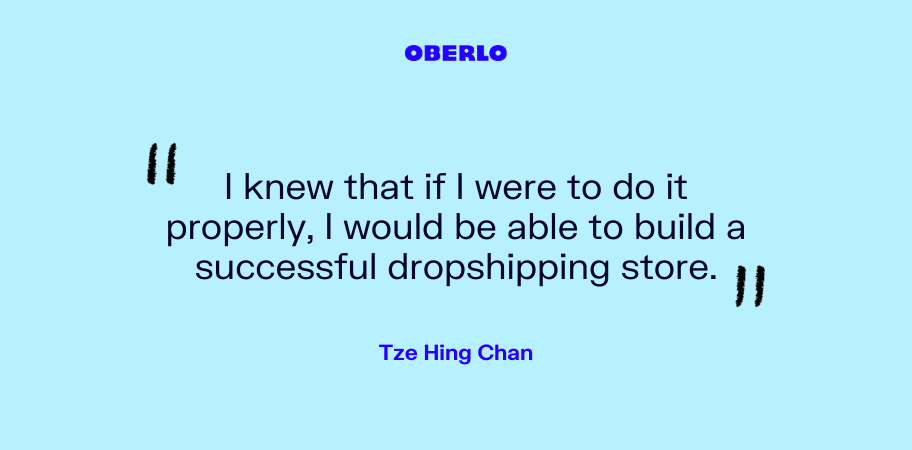
Aleisha: Isn't that cha-ching sound like a bit of a drug hit when you get it the first time and then you just want more and more?
Tze: Yeah, yeah. There's an adrenaline rush when it hits you every single time. But for my current store, I've turned off the notifications.
Aleisha: Oh, stop, I'm jealous. Just, everyone, listen, when you get to the point when the cha-ching annoys you, then you're doing well. Well done you for being annoyed by the cha-ching. Okay, so you had the cha-ching, you had the powerful hit of the sale, and then what was it that made you think this is not gonna work?
You said you lost some money. Why did you pull the plug? I always love asking this 'cause I think some people pull the plug really quickly and other people let it, sort of drain their resources.
Tze: Yes, so I basically just looked at my Facebook ad metrics. So my return on ad spend wasn't... It was very low... It was below one. I still had sales but I was making losses. I just thought to put it aside for a while and build up more on learning how to build a store, learning how to do Facebook ads, and then get back into the game.
So, I feel that was the best way to make the most out of the cash I had.
Aleisha: Right. So you cut your losses and then you went back to figuring out what the next product and what the next store should be.
Tze: Yeah, yeah.
Aleisha: Interesting. So how long did it take you to then turn around and launch your next store and what was the next store?
Tze: So, after Singapore, I went back to Melbourne 'cause that was where I studied and I had half a year left of my studies. And during the whole time, I launched many stores. So, my next one was phone cases as well but what was different from the store was that I created a whole catalog of phone cases with different categories, different themes, and basically themes for each phone case.
Like for example, phone cases with background sceneries, phone cases with icons… That one didn't do well, as well but it made me learn how to create an organized store with categories and drop-downs which make the customer process a lot easier and more organized and that one failed.
And after that, I went on to create multiple stores, which also failed. I made sales but they did not... They weren't profitable.
My next big break was when I was scrolling on Facebook, and I am not sure if you've heard of the Facebook group called Subtle Asian Traits.
Getting His Big Break From a Facebook Group
Aleisha: Subtle Asian Traits. No, I haven't. Tell me more about Subtle Asian Traits, what do they talk about? What's the deal?
Tze: Yeah, so, basically it is a meme group. It is a meme page.
Aleisha: Okay, yeah.
Tze: And there are millions... I think one or two million people in the group.
Aleisha: Wow.
Tze: And they basically put up memes specially catered towards the Asian community, so, like Asian-Americans, Asians in Western countries. So, I was in that group and I saw a post about a seal in Japan, which had gone viral.
So it was just a seal in an aquarium and it went viral because it was a super round seal and it looked really cute. And then I went over to AliExpress, I just searched for the seal on AliExpress and I managed to find a plushie of that seal.
Aleisha: Let's rewind a little bit. You found the group, you saw the meme, you had this moment of like, "Okay, this seal, this little chubby, round seal, this is where my money is gonna go." And then you searched for it, which was very clever, and then you found... So let's explain if people don't know what a plushie is. Can you explain to our listeners what a plushie actually is?
Tze: So a plushie is basically a soft toy. Just a toy, a soft toy we can squeeze, it's stretchy and it's cute. The main thing...
The main point is that it has to be cute.
Aleisha: So if you go to... We can actually... I'm really grateful that you're happy to share your store name, it's SubtleAsianTreats.com. As soon as you hit the store, you'll see photos of these seals, which are... They're adorable. I can totally see why people are snapping them up because they're kooky, but also really cute and quite novel.
When you went on... I'm really always interested in when you are discussing doing business with a manufacturer, and you said you went to AliExpress. So did you contact the manufacturer and ask specific questions about these plushies because obviously, now this has become a huge part of your business, but you weren't to know that when you first started.
What was the process of doing your due diligence and connecting with the manufacturer to make sure that this is a good business arrangement for you?
Tze: So for the seal, I basically just looked at AliExpress reviews, which I suggest everyone do before they sell. Reviews and... You have to look at the photo reviews as well because I believe AliExpress reviews can be faked.
So the most important ones are the photo reviews and you wanna look at things like delivery times and the quality of the products. So for the seal, I just looked at the reviews, specifically photo reviews, and I just put them on my website and just sold them. As simple as that. I just made sure the reviews were good and genuine as well.
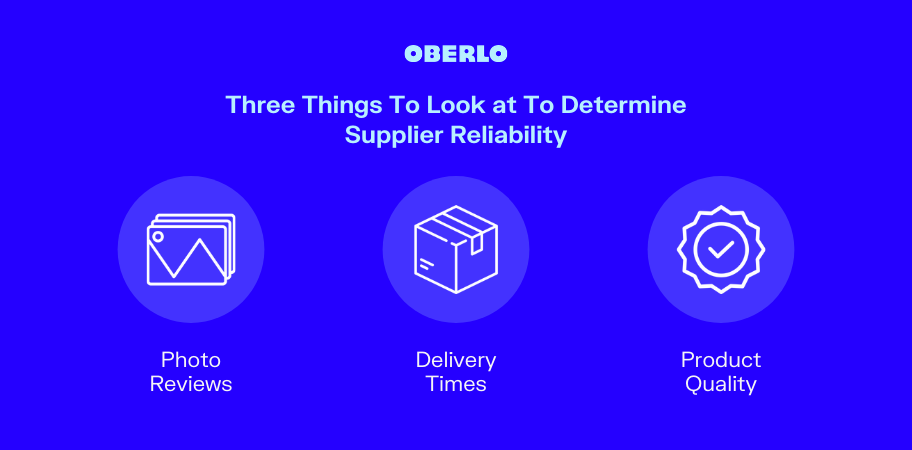
Aleisha: So Tze, did you then re-market your products back to that Facebook group?
Tze: Oh, no, so one of the rules of the Facebook group was that you can't promote any business.
Aleisha: Fine. I was like, that could have been a really good little audience for you straight away if they were liking the meme of the little seal.
Tze: Yeah, so I've actually thought of ways to promote my products on the page. So I've seen other dropshippers, they got their friends to just post genuine posts of their lives and they include the products in those posts.
For example, a photo of them just lazing around at home and the product beside them, and then people in the comments will ask them, "Where did you get the product?" And they'll just put their link to the product on their post.
Aleisha: Let's talk a little bit more about the progress of your store. so you found the seal, it went well, you did $7,000 in sales in how many days? Like 14 days?
Tze: Yeah, yeah, in two to three and a half weeks. And then after that, it died down. Yeah, it died down, I think, it was right before Christmas, and I'm not sure why but the metrics, the sales just went from a few, five to six a day down to zero to one.
And it was probably because of Christmas, and I didn't want to mess up the people who were purchasing for Christmas as well, so I decided to just stop because the delivery times were around two weeks, and it would definitely not reach in time for Christmas.
The Art of Hooks in Ads
Aleisha: So during that little lull then, what did you do? Because there are certainly a lot more products on your page right now that I think are quite popular. How did you come to add those products and decide which were the right ones for you to pursue?
Tze: Yeah, so after the seal, I actually started another store. So I started a store selling martial arts products because that was my passion and I like doing martial arts. So I thought, why not start a store related to my passion. But that turned out... That didn't really go that well because I realized that dropshipping mainly targets impulse buyers and for purchases of martial arts products or any sports products for that matter, they will go for quality branded products.
So they wouldn't just buy anything off the internet, which they've never seen before. They would trust big brands like Nike or Adidas.
So that was one thing I learned, and I took that into my... Back into my store Subtle Asian Treats and I just imported tons of products to make it look like a legit branded store selling only plushies. And that was when I found the Boba plushie.
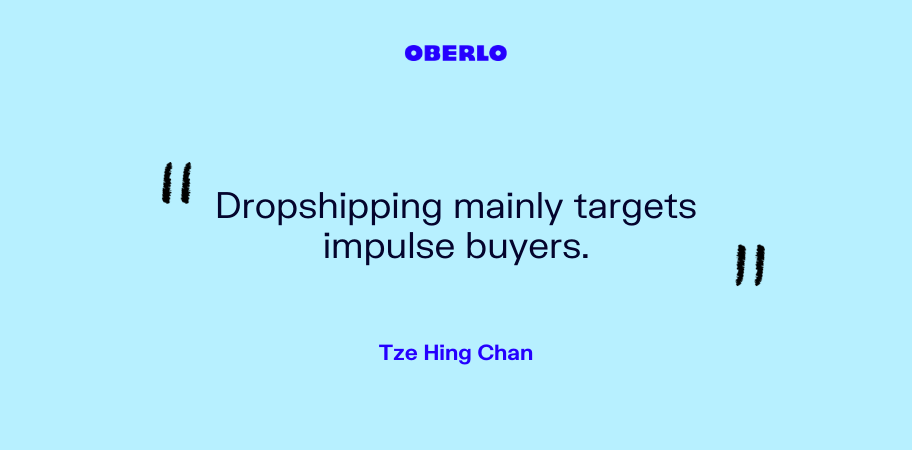
Aleisha: Okay, so let's... Before we get to Boba, you just made a really good point. I just wanna go back and really reiterate what you said 'cause I think... It's not been mentioned on the show before, but I think you are absolutely correct.
The impulse buying is such a good observation because I know a lot of people will buy on Instagram, they'll see an ad, and... I've done it multiple times where I've seen something pop up that I know is a dropshipper, and I'm not... I'm perfectly comfortable with buying from dropshippers.
But if I had more time to think about it, I probably wouldn't have gone... A few times, I wouldn't have necessarily gone back and bought it, but it is something I'm like, "That's a good ad. That looks great. It's got good comments." Boom, credit card in, I've purchased the item.
But it's not something that I would go back and think about a lot more. So that's such a great point to make for people listening, if they are looking at their advertising, I suppose it's trying to make things stand out and very amenable to people that just wanna make that purchase on the spot.
Tze: Yeah, and it's really... It's gotten really easy right now for me to identify dropshipping ads, so the most common captions they'll have is “50 percent off,” “free shipping,” “limited time only.” And you don't really see big brands doing that.
I would say it reduces their credibility 'cause if your products are actually good, you wouldn't need discounts to get people to buy them, people would just come to you straight. So that's what I've been experimenting with my ads as well.
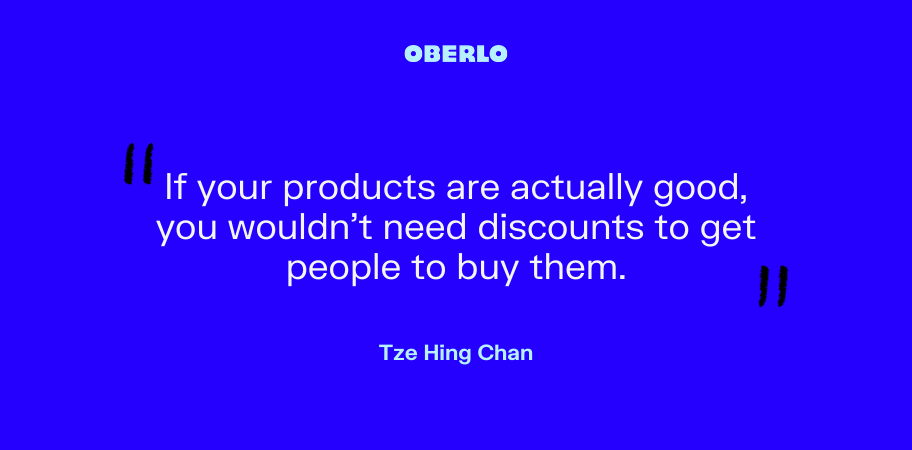
Aleisha: So you were very aware when you were creating your advertising, not to then create these sorts of big discounts or huge markdowns for no reason when they're just seeing your product for the first time.
Tze: Yeah. So, I mean, it's not wrong to do it. Just don't overdo it. I will put a maximum of just one hook on the ad, for example, just the discount or just the free shipping. But not all at the same time because it looks too scammy, I would say. It looks too much of a hook.
The Big Boba Break
Aleisha: Okay, let's go back to Boba tea, which some people might know as bubble tea if they've never come across it before... A very popular drink in Asia and Australia, as you mentioned as well. And also the imagery of bubble tea is really popular. As you said before it became like a thing in the last sort of two years.
People have been using the bubble tea, like the vector or the image everywhere, and you'd mentioned earlier on in the episode you had bubble tea phone cases that you were selling. So how did you then get to come back full circle to bubble tea or Boba tea and make that a thing for your business?
Tze: So it was just a bit of luck, actually. So I was actually in a process of just importing tons of products into my store, and then one day I just saw this Boba tea plushie on AliExpress, and it had like zero sales.
Aleisha: Right.
Tze: And there were only two suppliers selling it. So I knew that it was a totally new product. And it looked really cute, so I just brought it into my store and I just tested it out a bit and it went really well for the first week or so, and so I just scaled up.
And within two months, I made $100,000 in sales. And yeah, that was my biggest store to date.
Aleisha: Can I go back and ask you a quick question about when you were moving and adding all of those images and products to your store? I think people underestimate how much work that is.
Can you talk me through the process of importing all the photos and removing the backgrounds and writing all the copy? Because you didn't just pull descriptions from AliExpress, you wrote sort of creative, quite fun product descriptions for each of your listings. How long did that take?
Tze: So that took around two, three entire weeks. So daily... I spent entire days on that and coffee really helped. I took, like, coffee daily, every day. And so my goal was to speak like my customer, have the same tone of voice to the people that I'm appealing to. So plushies, I would say like millennials, young people, 20+, 20, 30s. And plushies, usually girls, I would say, not to be sexist, but I would feel girls usually like plushies more.
Aleisha: Yeah, it's a pretty female-skewed item. I would definitely agree with you there
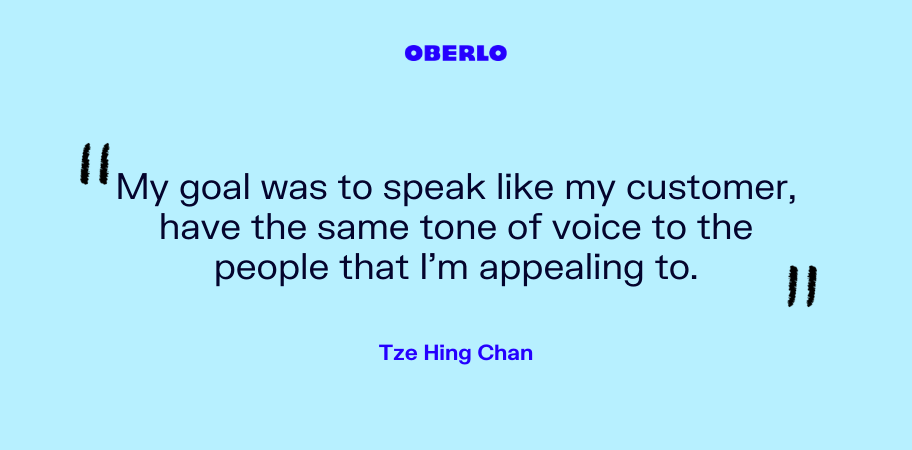
Tze: Yeah, so I had to dig down deep and just think of fun descriptions for each product, and yeah, I focused the bulk of my efforts on the Boba plushie because that was already selling really well. And for the others, they were just short descriptions, but the main point was to speak like my customer.
Creating Product Photos
Aleisha: And your imagery as well. When you sort of look at the images that you use, obviously, this has developed over time. But you've got images with real people in it, you can see the product being used, especially 'cause you sell the Boba tea, the plushies in different sizes, you can see when the model is holding the plushie, you can see that the different size so people are aware of what they're purchasing.
It's all really basic stuff, but actually, it makes such a big difference when you're shopping on your store to actually see all the different examples. And the humor that you use in your descriptions is really fun. I saw on the front page straight away, it says... Your big banner says, there are pictures of three plushie Boba teas and it says, "Three flavors, four sizes, 500 percent sugar," and that just made me giggle, 'cause I was like, "That's funny," You're talking about a soft toy, but it's cute.
Tze: I guess it was just the coffee. I thought of that just on the spot. And also, one point to make is that Photoshop skills really help. So it allowed me to create banners and all the creatives that made me all my money.
Photoshop skills really, really help, because it allows you to get your point across to your customers a lot easier than just putting text in your banners, text in your images.
Aleisha: So are you getting… The photos of the plushies with the models, are you taking those photos, or are you buying them from somewhere? Tell me about where you get your imagery from.
Tze: So I would say most of my images are from AliExpress and the others are all stock photos, and I just Photoshop the plushies in. For example the banner on my front page, the one of the girl on the couch, that was just a stock photo and all the other plushies, I just Photoshopped them in and put in some shadows to make it look like a real photo.
Aleisha: That's really impressive because I suppose we would describe them as lifestyle photographs that aren't just white backgrounds. You can see the product being used, I think that's really clever and something that's certainly worth the exploring time if you have it or outsourcing to Fiverr or Upwork, one of these websites where you can get people to Photoshop if you don't have the skills. I think it's really worth the investment 'cause it looks great.
Tze: Yeah, yeah, definitely. If you know how to do things then you don't... You wouldn't even need to spend on outsourcing and it really, really helps in the long term.
Aleisha: One tip that I've learned recently is, if you use Canva, which is C-A-N-V-A dot com, it's an Australian invention, but it's gone everywhere. It's like an online Photoshop. And if you upload a photo to Canva now, you can remove with one click the background of the image, so you don't even need Photoshop skills. You could basically upload an image of a product and hit the button and it would remove the image, so you can add it to Amazon or wherever you're selling with the white background, and it's perfectly clean without any trouble.
Tze: So I didn't know that, I didn't know that Canva allowed you to remove white backgrounds. So initially, I was using just Photoshop, and it took a long time to just remove the background for just one photo. So I used another website called clippingmagic.com, so...
Aleisha: Okay.
Tze: Basically they use... They claim that they use AI to remove the backgrounds of any image, and it worked really well for me. I just drag the photo in and it just removes the backgrounds instantly, perfectly as well. It was a really good investment.
I spent around $10 and I could remove like 100 photos.
Aleisha: Clippingmagic.com.
Tze: Yeah.
Aleisha: Yeah, I mean, what's $10 when you can save like 15 hours of having to cut out photos on Photoshop? My goodness, I'd pay $50 for that, more...
Tze: Yeah. Yeah. Time's more important than money to me. Of course, when you have time, you can make even more money. So yeah...
Inspiring Copycats and Getting Ripped Off
Aleisha: Exactly. Exactly, exactly. So the Boba tea made you $100,000 within two months. You just found that perfect niche product that no one else was really selling and you went with it.
Tze: Yeah. So I think I was one of the first ones to sell it, and then, later on, the sales sloped down and metrics went down because everyone was just copying me. They copied my ads, copied my creatives, even copied the layout of my store. But one thing I would say is that, for me, it wasn't really sustainable.
Aleisha: So let's talk about the copycats because I think that seems to be, unfortunately, a big part of the industry that people just find something and then they realize a niche is really cooking hot and then other people jump on it straight away. You were very clever to find something that was not being sold very much, and then obviously you've made some good money quite quickly.
What was it like when you first started to see other companies basically ripping everything that you were doing? 'Cause you put the hard yards in, you put the work in, and you wrote the copy, and it seems like it was quite an arduous task of doing that.
How did it feel when you started to see these pages pop up? I'd be really mad if I were you, Tze.
Tze: Yeah, I was really mad at the start. But I realized being mad wouldn't solve anything. So, what I did was, I basically just used my support emails and just emailed all the stores and basically told them to take them down or else they would face legal action, or at least just change what they copied.
And if they didn't take any of those copied material down, I would just go onto Shopify's DMCA, take down or infringement page, and just submit the form there.
And usually, it works.
Aleisha: That's a really good point to make. If you're a store owner and that you are seeing that other stores are potentially using your copyright or copying your images, there are very easy means to be able to go ahead and report that directly to Shopify. And generally, things are acted upon really quickly. It's great advice, Tze. You shouldn't sit on your hands. You should make sure people are... People know that you're not gonna take it, especially if it's something that you've created.
So Tze, it is frustrating when people do rip you off but you have seemed to have taken it quite well as in you've run the distance and obviously, the store is still making money for you, it's still up, you're still running it, but you are now moving on to new endeavors.
Can you tell me a little bit about that process of deciding that you were going to move away from the plushies as your main focus and then also going into what you're doing now?
Using the Dropshipping Experience To Set up His Own Brand
Tze: So I decided to lower my marketing budget, my ads budget specifically once I saw that my return on ad spend went down drastically. It happened after two months, after I made $100,000 on the plushies and all the metrics started tanking.
So I gave it a little while, I gave it like one or two weeks more, and I changed my creatives, I changed my captions and everything, but it still didn't work out. So I decided to just drop it, drop all my paid advertising. I still ran organic posts like Instagram and Facebook posts.
But after that, I just decided to stop wasting my money on Facebook ads because it just wasn't working out.
Then, right now I'm actually doing a new business venture with a few of my friends and we're doing activewear. And it's not a dropshipping, we're working on our own brand. And I would say the skills that I've learned from creating the store is helping me immensely with my current venture.
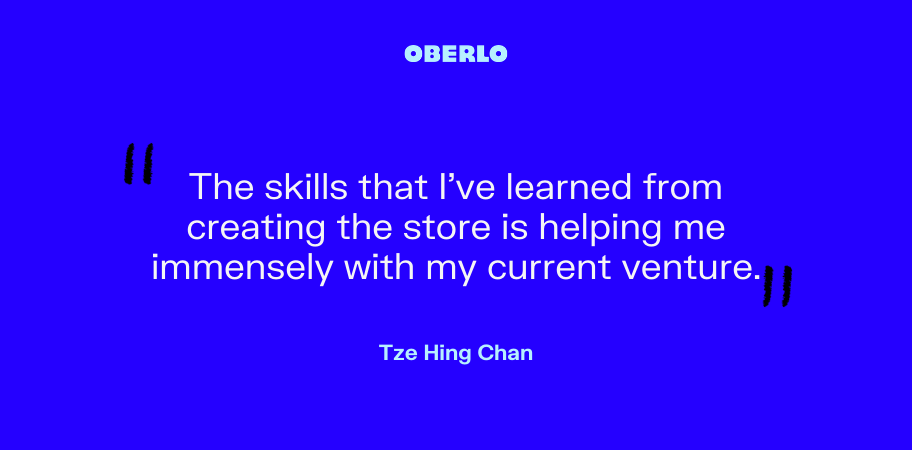
Aleisha: Interesting. We do hear a lot of stories about merchants who have done really well with dropshipping and ecommerce and who have then taken that into product development and I suppose it's such a natural movement for you because you understand the manufacturing, you understand the shipping, you've got the customer service stuff done, you know how to build a store, it's all there, it's just actually developing your own product.
Tell me a little bit more, without giving away too much, 'cause I know it hasn't launched yet, but tell me a bit more about working with manufacturers 'cause that activewear... This is the time, we're all sitting in activewear. I don't think I've worn proper pants for weeks. What is it that has drawn you to this product area? Is it because of COVID or is it just something you were interested in?
Tze: I would say it's just something that I'm just interested in. So, my other business partners, we're all... All of us are sporty people. We love to do sports, and the activewear industry it's just gonna go up like from... In the future, it will definitely... It's a booming industry so to say.
So our brand, we are actually starting off locally first because in Malaysia there's not a... There are budget activewear brands and then there are really luxury activewear brands, for example, Nike and Adidas, which cost a ton.
So what we're doing is that we're targeting the middle of the market, we're offering quality activewear products at an affordable price. There isn't any market in Malaysia for this, so I feel that by going into this we're targeting a specific demographic of people that are looking for quality, yet affordable, activewear products.
Aleisha: That's great, so you've really found that there's a gap in the market there for that sort of product, that's fantastic!
Tze: Yeah, we're still in the research and development phase. But the skills that I've learned from dropshipping for example, like speaking with suppliers and setting up the websites and all the ads on the store, they really carry on into building my current brand right now and if I hadn't started with dropshipping I think I would just fumble around and waste a whole ton of time just moving around Shopify and discovering the settings and stuff so. Yeah, dropshipping helped a lot.
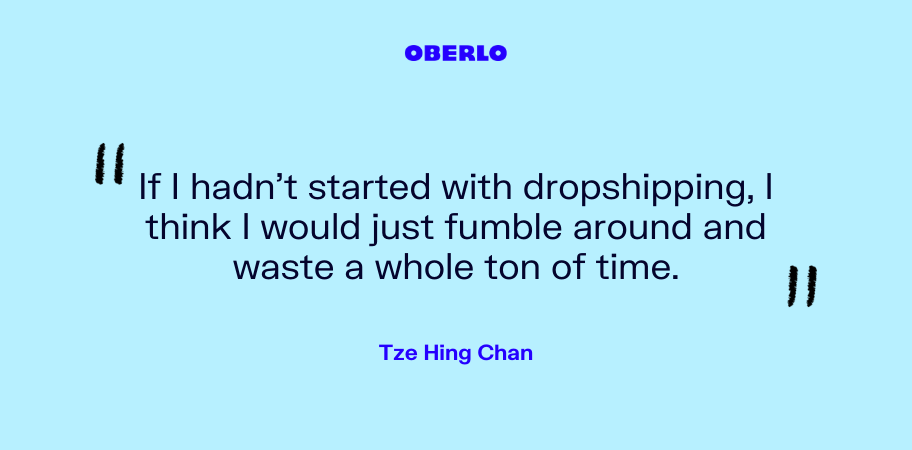
Aleisha: Yeah, I think it seems to be... The stories that we feature so often are where people really go for it as you have, have learned a lot of really valuable lessons, very quickly, and then have been able to take those skills and put them into other stores or other ventures that they've really fast-tracked because of that. So, yeah, it's a very fast-moving business but if you can make it work, it can be really, really satisfying.
Have you ever thought of selling Subtle Asian Treats and just getting rid of it, putting it on the marketplace, and making money out of it that way?
Tze: No I don't think I'll ever sell it because I put so much time and effort into this and I feel I just want to keep it, like, with me, like, forever, like, it's a testament to my hard work and effort.
Aleisha: Yes.
Tze: So I want it to be there and not just give it away to someone I don't know, who might just ruin the store or give it a bad name. So...
Aleisha: Sure, it's your first dropshipping baby that made you a lot of money, I get it, you don't wanna give away your kid that's fine.
Tze: Yeah, yeah it's my baby, I wouldn't wanna give away my baby.
Aleisha: And I'm sure it's still making you some money so that's not a bad thing.
Tze: Yeah so like even though I've stopped running ads, I'm still getting organic sales like every single day, so maybe like two or three sales a day, so yeah, that's purely passive income.
Aleisha: Yeah, that's fantastic. No one can complain about passive income. Tze, this has been really insightful, thank you so much for sharing all of the info and being really transparent with it cause I think it’s really interesting for people now to be able to go to your site and check out what you're talking about and also exploring what you've done with it.
It’s been really great so thank you very much for your time and there'll also be an oberlo.com blog post all about your journey and I know Allanah, my lovely colleague's working on it right now, and she's got lots of metrics and spreadsheets and data coming through so we'll be able to explore all of that as well.
Tze: Yeah thank you so much, Aleisha, it was great speaking to you.
Aleisha: Oh, that's so kind. Thank you.


